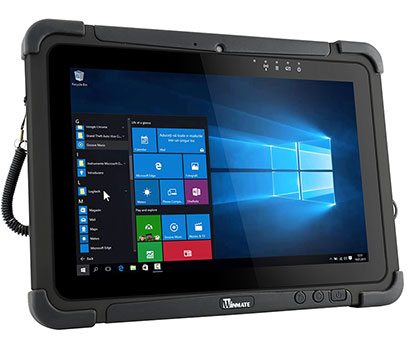|
Winmate M101S rugged tablet
Winmate's high-performance thin & light rugged tablet with high-res procap display now even more powerful with Intel "Kaby Lake" processor
(by Conrad H. Blickenstorfer)
Back in 2013, Winmate Inc. of Taiwan tackled an interesting challenge, that of creating a rugged Windows-based tablet for users demanding state-of-the-art design and technology on par, or ahead of, with what was then available in the consumer tablet space. And it had to be tough and rugged enough to hold up on the job and in the field. And also thin and light enough to be carried around all day.
The result was the Winmate M101B, which went on to become a big success. A year later, the 101B was joined by the more powerful M101H that brought Intel Core processing power to the platform. Fast-forward to April 2018, where Winmate just launched the next generation M101S.

Overall, the contribution that Winmate's M101 line brought to the table was this: while the tablet form factor quickly took off after the iPad's introduction in 2010, for quite some time the iPad absolutely dominated the tablet market. No one else came close, even though the iPad was fragile in the extreme and certainly not suited for heavy duty deployment. In addition, no one quite knew if a non-Apple tablet should run Windows or Android. And no one knew what it should look like in order to leverage the iPad's consumer market success into vertical and industrial markets. If it was too much like a consumer tablet, it wouldn't be suitable for rugged deployments. If it was too much like old-style industrial tablets, it'd remain mired in appealing only to small niche markets.
Winmate's genius was in creating a design that looked clean and modern and just reminiscent enough of consumer tablets to cash in on their appeal. But it also communicated toughness with its corner guards sitting on extended bezels, but not so much toughness to associate the design with the big, heavy old-style tablets of the past. Winmate also clearly understood that since iPads had sharp, crisp and easily readable displays from the start, the M101 also had to have a sharp, crisp high resolution screen. And it needed dual cameras like consumer tablets, and great battery life, and also an optional active pen, because Windows can be a handful without a mouse and just fingers to operate it.
Windmate got all of that right, and also realized that the proverbial "one size fits all" did not apply in their vertical markets. So they offered the M101 in a "light" version with a relatively simple Intel "Bay Trail" processor, a "high performance" version with a true-blue Intel Core processor, and then also Android.
M101S versus M101P
Just to quickly put the positioning of the two new 2018 models of the Winmate M101 line in perspective:
- On the "high performance side," the new M101S, powered by a 7th generation "Kaby Like" Intel Core i5-7200U processor replaces the older M101H than ran on a 5th generation "Broadwell" Intel Core i5-5200U chip. The difference here is somewhat faster base clock speed and turbo clock speed plus two Intel generations of processor performance and efficiency improvements.
- On the "light" side, the new M101P, powered by a quad-core "Apollo Lake" Intel N4200 processor replaces the earlier M101B, powered by an older "Bay Trail" N2930 chip. The advantage here is that N4200 can reach higher peak clock frequency (2.50GHz vs 2.16GHz) while capable of idling along at just 1.10GHz when processing loads are light (the N2930 base frequency was 1.83GHz). So the new setup is faster but gets longer battery life.
Overall, then as now, the high performance M101 tablets are well over twice as fast than the "light" versions. So keep that in mind.
What the M101S and M101P have in common
At first sight, the Winmate M101P and M101S seem to be identical. And the two models indeed have a lot in common.
- Display — Both models have a 10.1-inch screen with full WUXGA video. That's a 1920 x 1200 pixel, making for 16:10 wide-format and 224 pixels per inch. That's as sharp as Apple's retina MacBooks. And the display is of the IPS (in-plane switching) variety that makes for perfect viewing from all angles. Almost needless to say, both new M101 models use projected capacitive multi-touch for the effortless tapping, panning, pinching and zooming expected of modern tablets. The wide format and high resolution render the tablet perfect for Windows 10 operation, and you can work on it with gloves on and when it's wet.
- Size and weight — Both models have a footprint of 10.7 x 7.75, are three quarters of an inch thick, and weigh about 2.7 pounds. That's not totally thin and light, but definitely thinner and lighter than yesteryears rugged tablets, and certainly handy enough. No heavy metal frame here; construction is PC+ABS with rubber bumper corner protection overmolding.
- Battery and battery life — Both models come with a standard 38 watt-hour Li-Polymer battery that Winmate says is good for eight hours. An optional 76 watt-hour extended Li-Polymer battery doubles that to 16 hours. Those runtimes apply to both. Yes, that's thanks to the superior power management of the high-end Core chips.
- Ruggedness — Both are inherently rugged designs thanks to their tough PC+ABS case and overmolded TPR corner protection. Environmental specs include a very wide -4 to 140 degree Fahrenheit operating temperature range (-20 to 60 degrees Centigrade), which means that as far as temperature goes both can be used virtually anywhere. The tablets can handle 26 repeated drops from four feet per MIL-STD-810G, 516.6 IV to plywood over concrete. That's relevant because four feet is roughly the height a tablet is held while it's being operated when standing or walking. Sealing is at the IP65 level. That means total protection against dust, and ability to handle low pressure water jets from all directions.
Where the M101S and M101P differ
Given their substantial difference in performance, there are surprisingly few deviations between the two models.
- Thermal design — The much higher performance of the M101S comes at a price in the form of a fan. That's because the powerful Core processor in the M101S generates a maximum of 15 watts of heat that needs to be dissipated, whereas the Pentium N4200 in the M101P maxes out at just six watts, with no active cooling needed.
- Connectivity — The micro HDMI port is standard on the M101S and optional on the M101P. On the other hand, the lack of a fan means the M101P has room for an optional expansion port that can accommodate RS232 serial/USB.
- HazLoc and Medical — The fanless M101P allows cross-zone operation in ATEX Zone 2, Div 2 areas. The M101S doesn't. Likewise, the fanless M101P is suitable for medical environments whereas the M101S is less so.
New Winmate M101S vs older M101H
How does the new Winmate M101S differ from its M101H predecessor?.
- Higher performance — With its Intel 7th generation Core processor, the new M101S has an inherent performance and efficiency edge over the older M101H.
- USB 3.0 Type C — The new M101S has a USB 3.0 Type C port replacing the LAN/RS232 combo connector on the old M101H. The Type C connector is smaller and reversible, so no more having to flip the USB connector around because you tried to put it in the wrong way. In addition, with an adapter, the USB Type-C port can also function as a LAN/RS232 port or output HDMI, VGA, DisplayPort, and more from a single USB port.
- Newer tech — As you'd expect from an upgrade, WiFi and Bluetooth are of newer and faster standards, GNSS now supports not only GPS but also GLONASS and BeiDou, the main camera has higher resolution (8mp instead of 5mp), there are now dual microphones with noise cancellation, and the screen is even brighter (800 nits instead of 700).
Contact Winmate:
Web: www.winmate.com
Email: sales1 @ winmate.com.tw
OEM/ODM Contact: www.winmate.com/inquiry.htm
|
|
|
 Specifications Winmate M101S Specifications Winmate M101S
|
|
Status
|
Added 05
/2018
|
|
Form-factor
|
Compact Rugged Tablet PC
|
|
OS
|
Windows 10 IoT Enterprise (64 bit)
|
|
Processor
|
Intel "Kaby Lake" Core i5-7200U
|
CPU Base Speed
|
2.50GHz
|
CPU Turbo Speed
|
3.10GHz
|
TDP
|
15 watts
|
Thermal
|
Fan
|
Standard/Max RAM
|
4GB/8GB DDR4 SDRAM
|
Disk/drive
|
64GB-256GB mSATA MLC solid state drive
|
Card slots
|
1 x microSDXC card, 1 x SIM
|
Display type
|
IPS LCD with LED backlight (8-800 nits) and direct optical bonding, 85/85/85/85 viewing angles; optional AR and AG coatings
|
Display size/res
|
10.1-inch, 1920 x 1200 pixel WUXGA, 224 ppi (like Apple MacBook retina)
|
Digitizer/pens
|
Projected capacitive touch (rain and glove-capable); optional active pen
|
Keyboard/scale
|
NA
|
Navigation
|
Touch
|
Operating temperature
|
14° to 122°F (-10° to 50°C)
|
Sealing
|
IP65
|
Vibration
|
MIL-STD-810G Method 514.6 Procedure I
|
Shock
|
MIL-STD-810G Method 516.6, 4 ft to concrete
|
Humidity
|
10% to 90% (non-condensing)
|
Certifications
|
FCC, CE, EN60601
|
Housing
|
PC+ABS with rubber bumper corner protection overmolding
|
Size (WxHxD)
|
10.7 x 7.76 x 0.83 inches (271.8 x 197.2 x 21 mm)
|
Weight
|
2.7 lbs (1.2 kg) with standard battery
|
Power
|
Li-Polymer 7.4V, 5,140mAH, 38 watt-hours ("8 hours"); optional Li-Polymer 7.4V, 10,280mAh, 76 watt-hours ("16 hours")
|
Cameras
|
2mp camera front, 8mp AF camera with LED flash rear
|
Sensors
|
Ambient light, e-compass, gyro, accelerometer
|
Interface
|
1 x USB 3.0 (Type A), 1 x USB 3.0 (Type C), 1 x micro HDMI, 1 x 19-pin docking, 1 x audio (Mic in or Line Out), power
|
Wireless
|
802.11a/b/g/n/ac, Class I Bluetooth 4.2, GNSS (GPS, GLONASS, BeiDou), optional 3G WWAN (HSPA+, GSM/GPRS/EDGE) or 4G LTE (LTE, HSPA+, GSM/GPRS/EDGE, EV-DO
Rev A, 1xRTT), optional 1D/2D barcode and HF RFID
|
List price
|
Inquire
|
Web
|
Winmate M101S webpage
Sales1@winmate.com.tw
|
Brochure
|
 Winmate M101S spec sheet Winmate M101S spec sheet
|
|
 Winmate M101S Winmate M101S
|

|
|





